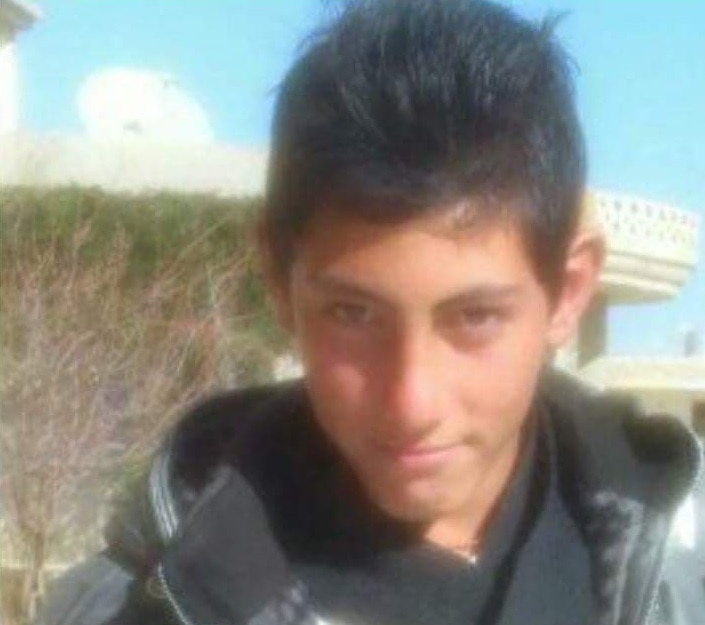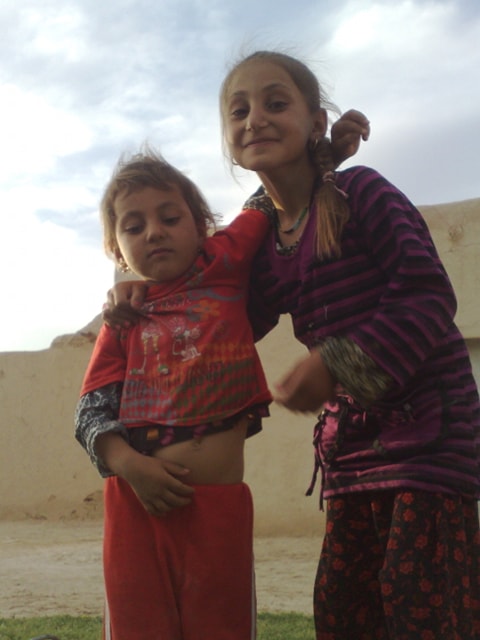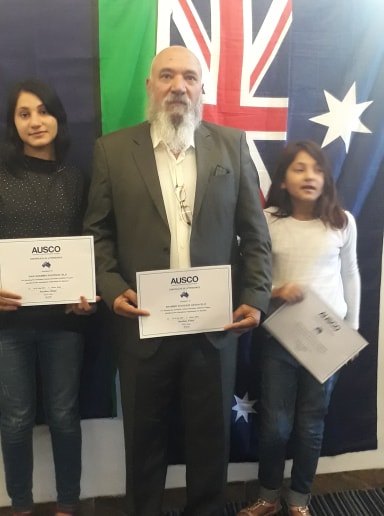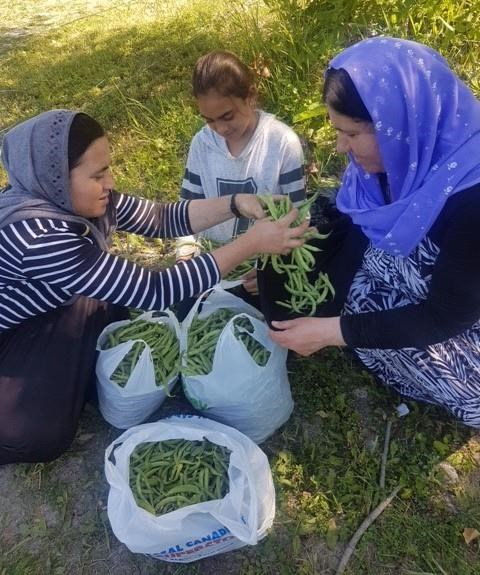The Soviet ban on religionYazidis in Georgia are struggling to find their identityAfter a lull during Soviet times, and ostracised due to Christianity’s dominance, the Yazidi faith is now attempting to re-establish itself in the fabric of Georgian life.
“Back then, we didn’t need religion. Our god was Lenin,” says Sheikh Nuri Shekhnamati, a priest at the Quba Sultan Ezid, a Yazidi temple in the capital Tbilisi.
“People were more humane. With today’s wild capitalism we struggle to live day by day. The time came for religion. Religion can help. Everyone needs some kind of spirituality,” he adds.
The temple sits on top of a hill in the outskirts of Tbilisi, surrounded by crowded Soviet-era housing blocks on one side, and a ghostly new Chinese-built mall, the biggest one in the Caucasus, on the other. It was a typically quiet day at the temple, and Shekhnamati made us tea and offered us sweets as we sat with him in the kitchen.
Yazidis are a Kurdish-speaking religious minority from northern Iraq. While most of the population lives in Iraq today, there were two waves of migration to the Caucasus in the 19th and early 20th centuries. Some Yazidis identify as ethnic Kurds, others as ethnic Yazidis, and this debate can be divisive.
The monotheistic religion has no holy book, and its sacred texts are orally transmitted by members of their priestly castes, such as Shekhnamati, who was born into a family of priests known as sheikhs. Yazidi priests do not formally teach the religion to their followers and many sacred texts are hidden from non-Yazidis. Until recently, no temples were built outside of the Yazidi heartland in Iraq.
In the Caucasus, the modernising drive of the Soviet Union caused many members of the priesthood to lose this orally transmitted knowledge.
“I started learning the texts later in life, in my mid-20s. I was more interested in my professional career, but people kept asking me to learn the religion,” he recalls. “I had no right to refuse: I was the son of a sheikh.”
Instead, he studied electrical mechanics for trains and subway systems, and in his last job before joining the temple, he fixed street lamps. He lives with his wife, son, daughter-in-law and grandchildren, in a flat in an old housing blocks not far from the temple.
Social upheavals and political transitions took their toll on the survival of the Yazidi religion in Georgia. “Our community was dying out,” says Dimitri Pirbari, the temple’s spiritual leader. But mobilising a community with no book, no institutions and no centralised structure proved the biggest challenge.
At the time of its launch in 2015, the Quba Sultan Ezid was the second Yazidi temple in the world outside of Iraq. With its single spire and bare-walled interiors, it is modelled on the mausoleum of Lalish, the main Yazidi pilgrimage site in northern Iraq.
On the other side of the grounds, a pyramid-shaped glass building serves as a centre for Georgian and Kurdish language lessons, and a recently launched course teaching the Yazidi religion and its history to any member of the public. Hanging on the centre’s walls are archival photographs, including an image of Tbilisi’s Yazidi community at a march commemorating the anniversary of the October Revolution in 1938.
It was the response from a community that had come dangerously close to losing its presence in Georgian society.
“The process of assimilation is really evident in our community. We’re losing our language and our religion. We don’t have a homeland,” says Lili Safarova, a Tbilisi-based women’s and education activist who was involved in the initial stages of the temple’s creation. “We needed a space to continue our language and our traditions.”
At the time of the collapse of the Soviet Union, the Yazidi community of Georgia numbered around 33,000. The rise of Georgian nationalism and ongoing civil war in the 1990s caused waves of migration to Russian cities and later to Europe. By 2002, the number of Yazidis living in Georgia had halved to around 18,000. In 2014, fewer than 12,000 remained.
In religiously conservative Georgia, where the Orthodox Church’s influence plays a powerful political role, the creation of a dedicated space for the Yazidi community in Tbilisi took more than two decades from conception to reality.
The idea of a temple and cultural centre was floated as early as the 1990s. The land was then acquired from the government in 2007, and permission to build a temple was granted by Patriarch Ilya II in 2010. The Yazidi religion was officially recognised as a public entity in Georgia in 2011.
Political reforms after Georgia’s Rose Revolution of 2003 facilitated the process. Georgia is home to many minorities and religions, and Tbilisi has historically been a diverse and cosmopolitan hub city.
But after the collapse of the Soviet Union, and until 2005, no religion other than the Georgian Orthodox Church could be officially registered. Amendments to the civil code in 2011 allowed minority religions to register as public entities.
“We advocated the issue because it gave legal status to all our organisations. We did not have this possibility before,” says Agit Mirzoev, a Tbilisi-based public defence lawyer who is involved in the temple and spiritual council’s registration.
The Soviet Union suppressed religion, but it supported the Kurdish culture and folklore of Tbilisi’s Kurdish-speaking community, who were predominantly Yazidis. In Tbilisi, a Kurdish theatre run by the community held regular performances, but it stopped operating in the early 1990s, after Georgia’s independence.
“The theatre was a source of pride for us at the time. For the children of a generation that was predominantly illiterate, to be writing records of our culture and history...” recalled Vitali Nabiev, a Yazidi journalist from Tbilisi who now lives in France.
With the absence of a dedicated space, Kurdish nationalist groups from the Middle East filled the vacuum. The Kurdistan Worker’s Party (PKK) had an office in Tbilisi and was active in the 1990s, transmitting extremist literature, recruiting fighters and facilitating travel to Turkey through Moscow. Leaders of the Kurdistan Regional Government in Iraq also supported cultural activities such as radio stations and newspapers, and made donations to the existing temple.
Today, while inter-ethnic tensions have softened in Georgia since the 1990s, economic and social issues remain for the Yazidi community.
“I can count on my fingers the number of Georgian Yazidis who’ve come out of poverty. Many do not pursue a higher education. Until recently, many did not have faith in the electoral system and did not participate in elections,” says Isko Daseny, a Georgian parliamentarian and member of the Yazidi community.
But the biggest threat for the community is the loss of identity.
Since its opening, the activity at the temple has trickled slowly into the lives of Yazidis in Tbilisi. “I come here three to four times a month with my family,” says Rafael Adjamyan, a young resident of Tbilisi. “When I was growing up we could only dream of a space like this. There are a lot of rumours about our religion. We needed a space to get accurate and reliable information.”
But overall visitor figures are unclear. “It’s difficult to say how many people come,” says Shekhnamati, “On a busy day, we get up to 100 people. But yesterday nobody came, and the day before that 20 visitors.” Of the approximately 1,000 Yazidis he estimates live in the vicinity, only some 300 visit the temple.
At the time of its launch in 2015, the Quba Sultan Ezid was only the second Yazidi temple in the world outside of Iraq (Lemma Shehadi/The Independent)
Rather, the traditions of Yazidis in the Caucasus are centred around the community’s homes and cemeteries. The religion’s strict caste system assigns the role of religious teachings to pirs, which means elder in Kurdish, or sheikhs. Every Yazidi has their own pir and sheikh, including the pirs and sheikhs themselves. Yazidis visited leaders from the priestly castes of pirs and sheikhs for weddings, funerals and other holy days.
“For spiritual matters, I go to my pir,” says Emma Kalashov, a retired cleaner living in one of the vast housing units of Varkatili, a neighbourhood near the temple – “My pir is my temple.” Her visits to the physical temple, she adds, are limited. “I may go four times a year, when my family visits from abroad.”
Emma’s pir, Edik Pir Drbes, lives in her building. On the door to his flat is a small sticker of Lalish’s conical spires, and large peacock-shaped ornaments line the walls and shelves of his living room.
And though Yazidis do not have a book, Pir Drbes has a large peacock-emblazoned book-shaped case high on a plinth against the back wall.
Pir Drbes describes the mysticism at the heart of the religion and its language. “Nobody can see God Himself. I associate God with the sun, and I pray facing the sun,” he explains.
In addition, Yazidis believe in seven holy beings, headed by an archangel, Tawus Melak, who takes the form of a peacock. “Melak tawus is an angel coming from God – he has power and reigns on everything on earth,” says Pir Drbes. “After God the most respected persons in our culture are our parents.”
“No religious event can happen without the presence of a pir or sheikh,” explains Pir Drbes. “We are there for weddings and funerals to recite prayers. With our own hands, we sew white clothes for the dead before they are buried.”
Pir Drbes was initiated to the religion’s sacred oral traditions from a young age. “I was 10 years old. My father died young so my brother taught me what he had learnt from our grandfather. I visited families with him and learnt that way.”
In his bedroom, he shows us his ster, a shrine consisting of stacked mattresses, which is found in Yazidi households in the Caucasus. Academics believe this tradition emerged out of the originally nomadic nature of Caucasian Yazidis.
“When we were cut off from Iraq we created these domestic altars in our homes. When the sun is not visible, I open this shrine and pray to it,” he explains.
He pulls out a plastic bag from within the mattress heap, which contains soil, cotton string and pearl-shaped clay balls gathered from his recent trips to Iraq.
Pirs and sheikhs typically receive alms from their followers. But grinding poverty in the Caucasus caused many to turn away from spiritual matters. “The church charges very high fees for its services, but as Yazidi priests, we take whatever our followers can give us,” says Pir Drbes.
As he drove us through the sprawl of housing blocks to the local cemetery in his 4x4 German car with leather seats, with the letters “P – IR” on his license plate, Pir Drbes explained that he does not have a job other than his spiritual role. “I prefer to serve the people.”
By contrast to the informal, unwritten traditions described by Pir Drbes, the leaders at the temple pursue an active spiritual, educational and political strategy. “Our first aim is to be recognised as an institutionalised religion. Without this it’s difficult to dialogue with other religions,” explains Pirbari.
The Yazidi religion has no institutional hierarchy. There is one political leader, the Mir, and important religious figures who form a spiritual council in Iraq. But when the Yazidi Spiritual Council of Georgia was registered in 2011, it appointed its own spiritual leader.
Pirbari dresses in white cotton robes and headband, typical of a priest in rural Iraq. Greeting us in the reception room, he recalls his nostalgia for Dighomi, the neighbourhood which he grew up in Tbilisi. Like much of the city, it has been affected by ongoing uncontrolled construction. On the wall behind him is a painting of the mausoleum at Lalish, and on the adjacent wall hangs a northern Iraqi rug.
“I want the spiritual content of the Yazidi religion to inform the daily lives of Yazidis,” explains Pirbari.
As such, the temple has revived rituals which did not previously exist among Yazidis in the Caucasus. Pirbari has strong connections to the spiritual leadership in Iraq, and In June this year, the temple brought in qewwals, members of the Yazidi spiritual castes whose role is to sing sacred texts, and who only live in Lalish, Iraq. “There was a lot of admiration for them,” says Pirbari, “It is one of the ways in which we are trying to recover our traditions.”
Some view the temple in Tbilisi as a contemporary expression of the religion. “They’re trying to create a ‘modern’ form of Yazidism that could be seen as more ‘systematic’ and understandable to the younger generation,” says Khanna Omarkhali, an Associate Professor at the Free University of Berlin and a member of the Yazidi priesthood.
The temple extols the view that Yazidis are a distinct ethnic group. “My studies in ethnology show Yazidism is an ethnicity and a religion. We are not Kurds. We have the right to self-identify,” insists Pirbari.
This is partly in response to the fact that, for decades, the Yazidi community has been caught between different parties of the Kurdish struggle in the Middle East. “We don’t want to be part of these political games,” says Mirzoev. “We have peaceful aims as citizens of Georgia.”
The educational centre, named the “Theology Academy”, teaches religion, language and history, and is the first of its kind in the world. A Department of Yazidism, headed by Pirbari, will soon be created at the Tbilisi’s Ilya State University’s Institute of Oriental Studies.
But given the oral nature of the religion, this educational dimension is also met with scepticism.“Yazidi priests do not learn their religion in schools. We inherit the knowledge from our parents and grandparents,” says Reza Muradyan, a young priest and shop owner from Tbilisi. “We can’t talk – at least until now – about an explicit theology among Yazidis, first of all because they do not have a sacred writ,” adds Omarkhali.
The spiritual council also acts as a political engine. “We are more mobilised and self-organised than ever. We have good communications with the government and with other religions in Georgia, especially the Georgian Orthodox Church,” adds Mirzoev.
“We want to be part of a process which facilitates peaceful relationships between different world religions,” says Pirbari. “We openly declare humane values of mutual respect and love.” Pirbari has facilitated meetings for the Yazidi spiritual leadership in Iraq with the Vatican and Russian patriarchate, among others. Above his desk in his office is a gold-plated, peacock-shaped relief sculpture which was a gift from the Iranian cleric Ayatollah Shahrestani.
But the temple’s emphasis on the religious aspects of the Yazidi culture has attracted criticism from some quarters.
In downtown Tbilisi’s House of Friendship, a Soviet-era administrative building with an elaborate modernist facade, Safarova, the women’s activist, describes her concerns: “Today the space is run by a small number of religious persons who have alienated the young in particular.”
The temple’s main sponsor, Suliko Simaev, a Tbilisi-based businessman whose company sells home security systems, agrees.
“The original idea was to have a public cultural centre and a small temple. The young would come to the cultural centre, join its educational activities, and also learn about their religion.” he says, when we met him in his office in the northern suburbs of the capital.
Partly, the view that Yazidis are an ethno-religion has been divisive. “Our critics are an old guard red star intelligentsia, most of them atheists,” says Pirbari, referring to the fact that the Soviet Union supported Kurdish culture and banned religion. Nonetheless, respondents interviewed for this article of all ages identified as ethnic Yazidis, Kurds or Yazidi-Kurds.
Further, many members of the community are not recognised by the temple, including Georgian Yazidis from mixed marriages. “We welcome everyone, from every religion at our temple,” says Pirbari. “But according to our religion, we cannot recognise Yazidis that come from mixed marriages as Yazidis. We will welcome them as members of another religion.”
“We are fighting for survival, not radicalism,” insists Pirbari. But others disagreed. “We wanted a space that would unite us,” says Safarova, “but now we are divided.”
https://www.independent.co.uk/news/worl ... 39456.html




























